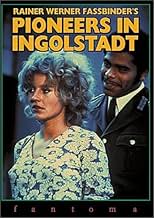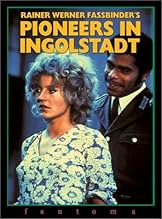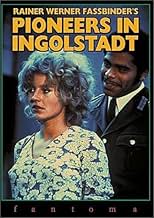अपनी भाषा में प्लॉट जोड़ेंBerta, a naive young maid, searches for love when the army engineers come to town to build a bridge.Berta, a naive young maid, searches for love when the army engineers come to town to build a bridge.Berta, a naive young maid, searches for love when the army engineers come to town to build a bridge.
- निर्देशक
- लेखक
- स्टार
फ़ीचर्ड समीक्षाएं
In an undefined period of time in Germany, the virgin maid Berta (Hanna Schygulla) expects to find her Prince Charming among the soldiers that are building a bridge over an old river. Her friend Alma (Irm Hermann) is a slut that shags during the night with different soldiers in the park or in the toilet of a nightclub and asks for money for her services.
When Berta meets the soldier Karl Lettner (Harry Baer), she falls in love with him. A couple of days later, she makes love with him and he says "Auf Wiedersehen" (goodbye) to her.
"Pioniere in Ingolstadt" is a dull, amateurish and pointless film by Rainer Werner Fassbinder. The period of time is inconsistent: based on the car, the clothing and the hairstyle, it seems to be 1971 but the soldiers wear Nazi uniforms. Further, the characters are thrown on the screen without any previous development. My vote is four.
Title (Brazil): "Pioneiros in Ingolstadt" ("Pioneers in Ingolstadt")
When Berta meets the soldier Karl Lettner (Harry Baer), she falls in love with him. A couple of days later, she makes love with him and he says "Auf Wiedersehen" (goodbye) to her.
"Pioniere in Ingolstadt" is a dull, amateurish and pointless film by Rainer Werner Fassbinder. The period of time is inconsistent: based on the car, the clothing and the hairstyle, it seems to be 1971 but the soldiers wear Nazi uniforms. Further, the characters are thrown on the screen without any previous development. My vote is four.
Title (Brazil): "Pioneiros in Ingolstadt" ("Pioneers in Ingolstadt")
Pioneers of Ingolstadt is one of the early works of the inspired, prolific dramatic director RW Fassbinder, and it may be a very good minor work but minor all the same. It's about a group of soldiers who have been brought to the small town of Ingolstadt to build a bridge. Not much drama happens there as that goes as planned; the meat of the film is the interactions with the local women (i.e. Hanna Schygulla, Irm Herrmann who one might recall from The Merchant of Four Seasons), and how they have some varied personalities (Schygulla wants true love, Herrmann likes to fool around, another girl has... her own thoughts), while the men are, perhaps by design, practically all the same.
It speaks to how much I like Hannah Schygulla and some of Fassbinders other early/consistent players that this was not only watchable but okay, though at the same time it left me wanting more from the characters and from some of the filmmaking itself. As I have worked through Fassbinder's early filmography (as in before Whity and Beware of a Holy Whore and his breakthrough year 1972), I have found it somewhat hit and miss. Even more then his other work, this has such a detached feeling about it, how everyone is disillusioned but also holding back their emotions (in the Bressonian influence I'm sure), and I felt something I don't like when I'm watching a Fassbinder film: boredom.
Its like, we get it, these soldiers toiling at this small town bridge and the local girls who have nothing much else better to do than spend their time with these "pioneers" as they're ironically called, are at best aimless and at worst miserable and cruel and (in their way perhaps) more or less deserve each ether. But this point is driven by Fassbinder, adapting a play he didn't write for German TV, to the point where I didn't care that much for anyone. If it weren't for the natural screen presence of (most of) the actors it might be one or Rainer's lessor films - or, to put it another way, he's explored many of the same themes in other, stronger, more memorable works, or at least with more memorable characters.
And who knows, maybe it wasn't the best idea for me to check this out at the end of a very long work day on 5 hours of sleep. It also doesn't help that the cameraman here has some strange inspirational ideas like... Having a cheap one-light on a camera pointed at actors walking and talking in a dark street. But that's just one example.
It speaks to how much I like Hannah Schygulla and some of Fassbinders other early/consistent players that this was not only watchable but okay, though at the same time it left me wanting more from the characters and from some of the filmmaking itself. As I have worked through Fassbinder's early filmography (as in before Whity and Beware of a Holy Whore and his breakthrough year 1972), I have found it somewhat hit and miss. Even more then his other work, this has such a detached feeling about it, how everyone is disillusioned but also holding back their emotions (in the Bressonian influence I'm sure), and I felt something I don't like when I'm watching a Fassbinder film: boredom.
Its like, we get it, these soldiers toiling at this small town bridge and the local girls who have nothing much else better to do than spend their time with these "pioneers" as they're ironically called, are at best aimless and at worst miserable and cruel and (in their way perhaps) more or less deserve each ether. But this point is driven by Fassbinder, adapting a play he didn't write for German TV, to the point where I didn't care that much for anyone. If it weren't for the natural screen presence of (most of) the actors it might be one or Rainer's lessor films - or, to put it another way, he's explored many of the same themes in other, stronger, more memorable works, or at least with more memorable characters.
And who knows, maybe it wasn't the best idea for me to check this out at the end of a very long work day on 5 hours of sleep. It also doesn't help that the cameraman here has some strange inspirational ideas like... Having a cheap one-light on a camera pointed at actors walking and talking in a dark street. But that's just one example.
This was the first Fassbinder's films to get any kind of remotely mainstream distribution. It finds the autuer in an interesting transitional phase from the Bresson-by-way-of-Straub/Huillet aesthetic of his earliest films to the Sirkian melodrama of what is considered his "mature" style.
This movie is also a fascinating, rare depiction of life under the Nazis before the beginning of WWII and the horrors we most associate with the Reich. Here, the Nazi "Pioneers" are almost like New Deal-style government sponsored work crews, improving the national infrastructure. But the film repeatedly implies that the march to war and slaughter were not merely the result of orders from above but also of the overboiling ids of men injected with nationalist and militarist fantasies who had no way of fully working out their violent/sexual impulses in their own cultural milieu.
Rainer Werner Fassbinder was one of the leaders of New German Cinema in the 1970s. His movies often looked at Germany in the wake of WWII, and he directed almost nonstop before dying of a drug overdose in 1982. One of his early movies was "Pioniere in Ingolstadt", based on a Marieluise Fleißer play. Premiering in 1928, the play focused on the mending of a bridge by a group of army members. The people in the nearby town steal some of the wood to build a diving board. As a result, an endeavor which could have united the army and the townspeople ends up dividing them.
The setting of Fassbinder's movie is ambiguous; it looks like a cross between the 1920s and 1960s. Also, the movie emphasizes the recruits' taking sexual advantage of the women in the town, and how one of the women longs for a more meaningful relationship. In the end, this isn't Fassbinder's best movie but an OK one. His best movies are probably "The Marriage of Maria Braun" and "Veronika Voss".
The setting of Fassbinder's movie is ambiguous; it looks like a cross between the 1920s and 1960s. Also, the movie emphasizes the recruits' taking sexual advantage of the women in the town, and how one of the women longs for a more meaningful relationship. In the end, this isn't Fassbinder's best movie but an OK one. His best movies are probably "The Marriage of Maria Braun" and "Veronika Voss".
I really enjoy Fassbinder pictures, they have a sex thematic, exploiting this vast field not yet properly expanded, he makes an early sketch about to came, in a small city soldiers coming to build a rustic wooden bridge, then women's town interact with these soldiers hoping getting marry or something, however Alma (Irm Hermann) a beauty girl who just wants make sex by money, such behavior bother other single women on their purposes, Bertha (Hanna Schygulla) a former friend of Alma finds a lonely soldier who she falling in love, seemingly a right choice, among all this portrait Fassbinder expose to the audience his criticism and pessimism over this stormy hard days, aside some unfit sequence the movie flow easily, it's an art movie, it shall be treat as such, whatever other readings will be clearly doomed to failure, the ornery German Rainer Werner Fassbinder was an avant-garde director and deserves a better understanding over this stylized work!!!
Resume:
First watch: 2020 / How many: 1 / Source: DVD / Rating: 7.5
Resume:
First watch: 2020 / How many: 1 / Source: DVD / Rating: 7.5
क्या आपको पता है
टॉप पसंद
रेटिंग देने के लिए साइन-इन करें और वैयक्तिकृत सुझावों के लिए वॉचलिस्ट करें
विवरण
बॉक्स ऑफ़िस
- बजट
- DEM 5,50,000(अनुमानित)
इस पेज में योगदान दें
किसी बदलाव का सुझाव दें या अनुपलब्ध कॉन्टेंट जोड़ें































